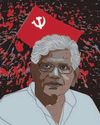
The Indian military has been fighting four enemies-the Chinese and the Pakistanis outside; and an ageing soldiery, and rising pay and pension bills within. To tackle the latter two, on June 14, the government announced the Agnipath scheme, or tour of duty. Under this, youth would be recruited between the ages of 17 and a half and 21, be trained for six months and be allowed to serve anywhere from Siachen to Secunderabad. After four years, though, three-fourth of them would be packed off with cheques for ₹11.71 lakh each, and whatever balance they had saved from their pay. Once out of the Army, they would not get any of the perks today's veterans get.
The government quickly moved to pacify the first group. A two-year relaxation of the upper age limit was announced for those who missed the call in the past two years. The government also promised quotas for demobbed Agniveers in the paramilitary and in civil jobs in the defence ministry and its PSUS. The offers clicked; protests died down. The veterans, however, are still divided over the efficacy of the scheme.
Actually, there is nothing new in the Agnipath idea, except the nomenclature. The soldier has been ageing ever since the military extended colour service in the 1970s. The problem got aggravated in the early 1990s when those recruited in the 1970s were still found to be serving at 37 and 38, bringing the average age to above 30. "The Kargil Review Committee and the Arun Singh Committee had raised objections on the average age of soldiers, which was in the 30s, during the Kargil war; it is 32 currently," said Lt Gen Anil Puri, additional secretary in the department of military affairs.
This story is from the {{IssueName}} edition of {{MagazineName}}.
Start your 7-day Magzter GOLD free trial to access thousands of curated premium stories, and 9,000+ magazines and newspapers.
Already a subscriber ? Sign In
This story is from the {{IssueName}} edition of {{MagazineName}}.
Start your 7-day Magzter GOLD free trial to access thousands of curated premium stories, and 9,000+ magazines and newspapers.
Already a subscriber? Sign In

A golden girl
One of India's most formidable beauties passed away earlier this month. The odd thing is she would absolutely hate this obituary; she hated being written about and avoided publicity for all of her nine decades. Indira Aswani was 93 when she died. But anyone who encountered her, even briefly, was in such awe of her grace and poise, and one could not but remember her forever.

The interest in wine is growing delightfully in India
The renowned British wine writer and television presenter Jancis Robinson, 74, recently came to Delhi and Mumbai to reacquaint herself with India's wine industry. This was the Robinson's fourth visit to India; the last one was seven years ago. On this trip, Robinson and her husband, restaurateur Nicholas Lander, were hosted by the Taj Hotels and Sonal Holland, India's only Master of Wine.

United in the states
Indian-Americans coming together under the Democratic umbrella could get Harris over the line in key battlegrounds

COVER DRIVE
Usage-driven motor insurance policies offer several benefits

GDP as the only measure of progress is illogical
Dasho Karma Ura, one of the world's leading happiness experts, has guided Bhutan's unique gross national happiness (GNH) project. He uses empirical data to show that money cannot buy happiness in all circumstances, rather it is family and health that have the strongest positive effect on happiness. Excerpts from an interview:

India is not a controlling big brother
Prime Minister Tshering Tobgay considers India a benevolent elder sibling as the \"big brotherly attitude\" is happily missing from bilateral ties. He thinks the relationship shared by the two countries has become a model of friendship not just for the region, but for the entire world. \"India's attitude is definitely not of a big brother who is controlling and does not allow the little brother to blossom and grow,\" says Tobgay in an exclusive interview with THE WEEK.

Comrade with no foes
Lal Salaam, Comrade Yechury-you were quite a guy!

Pinning down saffron
In her first political bout, Vinesh Phogat rides on the anti-BJP sentiment across Haryana

MAKE IN MANIPUR
Home-made rockets and weapons from across the border are escalating the conflict

SAHEB LOSES STEAM
Coalition dynamics and poor electoral prospects continue to diminish Ajit Pawar's political stock